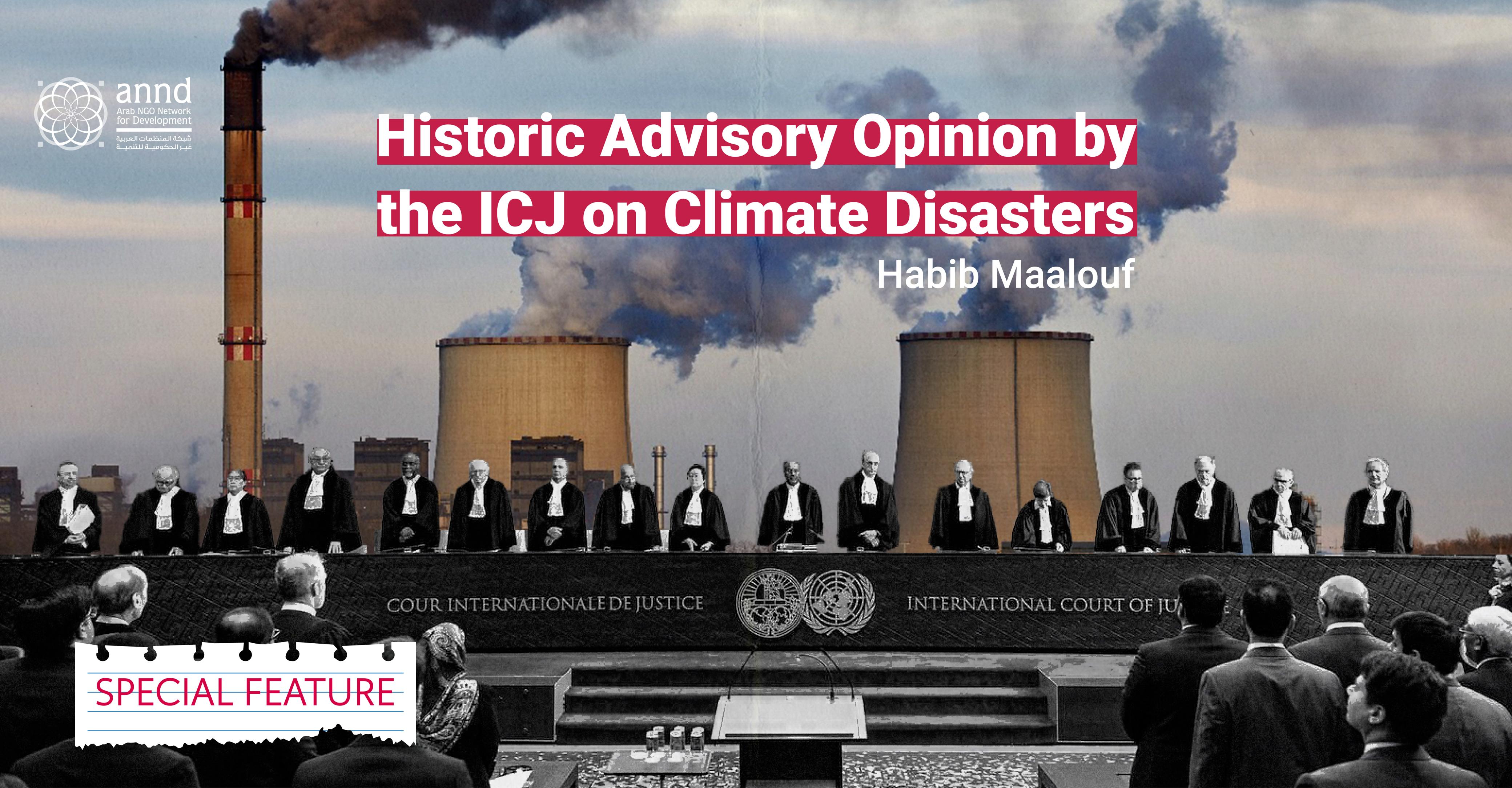
Historic Advisory Opinion by the International Court of Justice on Climate Disasters - Habib Maalouf

Historic Advisory Opinion by the International Court of Justice on Climate Disasters - Habib Maalouf
A new reference for litigation on climate disasters has emerged
The historic advisory opinion issued by the International Court of Justice on July 23, 2025, confirmed the responsibility of states to combat climate change and to prevent harm to the climate system, and that they have a duty to address the fossil fuel problem. Failure to prevent harm to the climate may lead to obliging them to pay compensation.
When presenting the 133-page document before the courtroom at the Peace Palace in The Hague, the President of the International Court of Justice, Yuji Iwasawa, said, "Climate collapse has severe and far-reaching consequences that affect natural and human ecosystems." He considered the consequences of climate change as an "urgent existential threat."
The decision was made unanimously (15 judges), confirming the responsibility of states for all types of activities that harm the climate, explicitly "accusing" fossil fuels. This means opening the door to a clear and explicit battle with states (and oil companies) of all kinds.
What does this mean? It confirms the role of states in taking appropriate measures to protect the climate system from greenhouse gas emissions, whether through the production or consumption of fossil fuels, or through granting licenses for exploration and extraction of fossil fuels, or contracting or providing subsidies, loans, and financing (for fossil fuels)... and failure to regulate these operations "may constitute an internationally wrongful act for which those states bear responsibility."
Some have viewed this decision as a "document" that will be a vital tool in upcoming climate negotiations, and it is likely to inspire those affected to file new lawsuits. Although advisory opinions are not technically binding, they are considered a reference because they summarize existing law rather than creating new laws. The important thing is that the International Court of Justice has widely opened the door to the possibility of suing major emitting and climate-disaster causing states to demand compensation, which may include rebuilding destroyed infrastructure and restoring ecosystems, as well as financial compensation.
The court's decision confirms that fossil fuels (coal, oil, and gas) are the main cause of climate collapse, as stated in the relevant international reports. However, those affected might argue that there was no mention of fossil fuels in the main text of the Paris Agreement in 2015. And climate conferences and participating states did not declare a "shift away" from fossil fuels except in COP28 held in Dubai in 2023, which most countries considered optional. The subject was avoided in COP29 in Baku last year, as well as in the preliminary discussions of COP30 held in Bonn this year!
We have always mentioned that the compromise reached to conclude the Paris Agreement in 2015 and its quick global ratification would not have happened except after stripping it of any binding content, especially by adopting the formula of "nationally determined contributions" rather than "commitments." This weakened the legal arguments for suing states, especially if the term "contribution" is interpreted to mean that the concerned state is not solely responsible, and that it contributes what it can and voluntarily desires, and that nothing legally binds it in the text neither to reduce emissions nor to compensate.
The court also said that states are legally responsible for the actions of the private sector and must regulate institutional activities that contributed to the climate crisis. This is a useful interpretation to assign responsibilities and should also apply to the issue of technology transfer. Major states argued when asked to transfer clean and alternative technologies (to fossil fuels) for free and as compensation (as stated in the 1992 Framework Convention on Climate Change, in which developed countries acknowledged their historical responsibility for emissions and the necessity of technology transfer). Later, in international negotiations, they argued that the private sector developed renewable energy technology and that states have no authority to require it to transfer this technology to developing countries! Knowing that support for scientific research in historically classified developed countries came from states and taxpayers, and that raw materials and labor for this industry mostly come from developing countries! So how will the international court’s decision be used to restore the role and responsibility of states in managing resources and people worldwide and controlling the runaway privatization trends free of any catastrophic responsibility or constraints? With an emphasis on the historical responsibility of developed countries? And what role should civil society play in restoring the roles and responsibilities of states and the United Nations together?
The same issue arose at the beginning of the search for who bears responsibility for compensation for the "losses and damages" resulting from unnatural climate disasters. Historically, the answer from American negotiators was that insurance companies are supposed to handle this issue. Fires that struck some U.S. states last year showed that insurance companies could only cover a small portion of the compensation value for disaster damages to insured persons, whose numbers decrease annually as insurance costs rise annually due to increased risks from climate disasters. For example, the fires in Southern California at the beginning of this year, according to estimates by The Economist, caused $50 billion in damage (the highest ever), while insurance companies only covered $20 billion for insured persons, according to estimates by JPMorgan. Note that the total cost of climate disasters last year exceeded $300 billion, surpassing all previous estimates and the annual figures estimated during the adoption of the loss and damage clause at the Sharm El-Sheikh climate summit in 2022 (COP27).
So how will the international court's decision on affirming state responsibility for compensation for losses and damages in both developed and developing countries, and for insured and uninsured people (who are the majority) alike, be translated into practice?
It is worth noting that the United Nations had commissioned the International Court of Justice to prepare this document in 2023 after years of campaigns led by a youth group of law students in the Pacific Islands and diplomacy led by the State of Vanuatu in the Pacific Ocean. The court held a two-week hearing last December and subsequently issued this document.
The world’s largest greenhouse gas emitting countries denied their responsibility for any obligations beyond the United Nations Framework Convention on Climate Change and the Paris Agreement concluded in 2015. The court firmly rejected this argument, stating that a set of other treaties applies, including the United Nations Convention on the Law of the Sea, the Vienna Convention for the Protection of the Ozone Layer, the Convention on Biological Diversity, and the Convention to Combat Desertification... and all international treaties related to environment and climate. The court mentioned that customary international law also applies, including principles of sustainable development, common but differentiated responsibilities, equity, intergenerational equity, and the precautionary principle. The court added that states also have a duty to work together to protect the climate because uncoordinated action "may not lead to a meaningful outcome."
The court said that a clean, healthy, and sustainable environment is a fundamental condition for exercising many human rights, such as the right to life, the right to health, and the right to an adequate standard of living, including access to water, food, and housing.
The International Court of Justice also targeted countries that are not parties to climate change treaties or have withdrawn from them, saying they still have to prove that their climate policies and practices comply with other aspects of international law. Here is a reference to the U.S. president signing a decision to withdraw from the Paris Agreement for the second time, with threats from right-wing leaders to take similar positions and consider climate change a socialist hoax!
The court’s conclusion is that it considers the climate crisis a global problem that does not exempt states from their individual responsibility and opened the possibility for affected parties to file climate-related lawsuits against those responsible. Despite this opened door, there will remain great difficulties related to how to prove or distinguish between natural disasters and climate-related ones. Knowing that proving a climate causal link is harder than proving local pollution... but the court confirmed that this is not impossible, perhaps relying on the development of scientific research or on an internationally agreed accounting or computational model linking data and measurements of specific emissions with corresponding climate disasters and their cost estimates. In all cases, the International Court of Justice indicated that courts may order compensation, including restoration of infrastructure and ecosystems. In cases where damage is irreparable, compensation may be claimed.
The International Court of Justice is the third court among four high courts to publish a similar document on the climate crisis. Earlier this month, the Inter-American Court of Human Rights (IACHR) concluded the existence of a "human right to climate," and both the Inter-American Court of Human Rights and the International Tribunal for the Law of the Sea confirmed the legal responsibility of states in controlling greenhouse gases.
In summary, the climate battle and climate justice issues are still at their beginning and are expected to develop as disasters unfortunately escalate. It should also be accompanied by civil society activity and struggle around the world, and pressure to allocate wide space for discussion at climate summits. More efforts should be made to revive global legal philosophies and principles such as the "precautionary principle" and prioritize them over other global principles such as "the polluter pays principle." For what use is compensation for irreparable losses in lives or species?
Decision Background
In September 2021, the State of Vanuatu (an island country in the Pacific Ocean) announced that it would request an advisory opinion from the court regarding climate change. This initiative was inspired by a youth group called "Pacific Island Students Fighting Climate Change," which emphasized the necessity of addressing climate change, especially in small island countries. After Vanuatu pressured other UN member states to support this initiative in the General Assembly, the Assembly adopted on March 29, 2023, a resolution requesting an advisory opinion from the International Court of Justice on two questions: What are the obligations of states under international law to ensure environmental protection? And what are the legal consequences for states under these obligations when they cause environmental harm? The UN Charter allows the General Assembly or the Security Council to request advisory opinions from the International Court of Justice.
Although advisory opinions are not binding, they carry great legal and moral authority and help clarify and develop international law by defining the legal obligations of states.
This is the largest case ever considered by the International Court of Justice, as evidenced by the number of written statements, which reached 91, and the countries participating in oral deliberations, which numbered 97 states.
Recent publications

